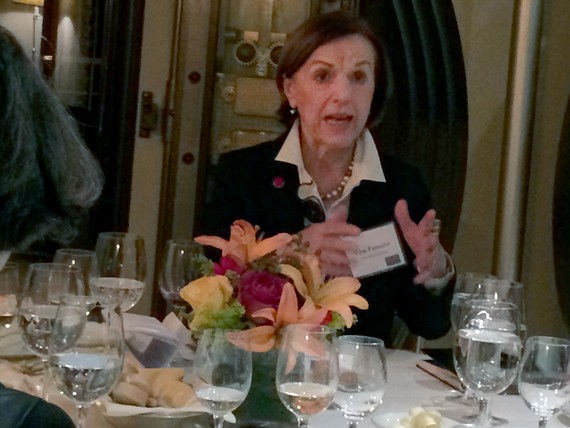When I think about why it's important to teach kids about money, I tend to focus on the payoff for individuals... I mean, life is a whole lot better if you don't have to worry about how you're going to scrounge up the cash to pay your next credit card bill.
But financial education plays another important role that I hadn't given much thought: When we make smarter choices for ourselves and our children, we are better citizens.
Recently, I had an amazing lunch at Cipriani on Wall Street with Elsa Fornero (pictured here), Italy's former Minister of Labor, and heard firsthand why financial literacy matters. I was invited by Annamaria Lusardi, the head of the Global Center for Financial Literacy at George Washington University and the Chair of the financial literacy section of the PISA (Program for International Assessment for Students) test, which will reveal how much 15-year-olds worldwide know about money matters this June. These are two passionate women from Italy who are so smart about money -- and have great taste in restaurants!
Fornero, previously an economics professor at the University of Turin, was given less than 20 days to reform the country's pension system (sounds like an insane reality TV show!) at a time when Italy's economy was teetering on the edge of collapse. She was also assigned the job of getting the labor market back on track.
"It was very harsh reform that had to be credible to the financial markets," she told us. "But it also was going to change people's lives and perspectives."
The reforms included changing how pensions were calculated and increasing taxes, moves that profoundly affected many families' retirement plans. At times, the austerity measures that she implemented were considered so harsh that she and her family received death threats, and she was assigned an armed guard for protection. At one point, during a press conference, she publicly wept as she announced some painful cuts, knowing they would hurt so many people. But, as she later wrote in the Wall Street Journal, "It is a tribute to the Italian people that I also received widespread support, mainly by ordinary citizens who realized that this was a necessary sacrifice to clean up the country's financial mess."
What I found most interesting, however, was that Fornero's biggest takeaway from this trying personal and professional experience was this: "Financial literacy can be a very important instrument to bring about reform," she explained. "If you have better, more knowledgeable citizens, you end up with better social welfare. There is a new awareness that the role of financial literacy is essential."
At a time when, around the world, nations are facing daunting economic challenges, it makes sense that ordinary people like us get a better handle on the role that debt, investments and long-term savings, for example, play in our lives and our futures. That way we'll be more active citizens and have a better shot at deciphering political pitches and understanding proposed new legislation that could be detrimental if we aren't paying attention.
A mother and grandmother herself, Fornero spoke passionately about the need for such education in our schools. One of her favorite recent experiences was watching her eight-year-old grandson's class simulate various jobs to learn more about economics and commerce. He was assigned a job in a flower shop and made it clear to all "customers" that tips were allowed.
Fornero thinks knowledge about money matters is particularly important to women. "Women's futures depend more on themselves than ever before," she said, adding that "everywhere we see women know much less than men about financial literacy."
Regardless of our age, gender or culture, financial literacy is the universal language that we all need to embrace, and Fornero would love to come up with a catchy slogan to express this idea. But I think she said it best when she concluded, "We must stand up for financial literacy."
Beth Kobliner is the author of the New York Times bestseller Get a Financial Life: Personal Finance in Your Twenties and Thirties, and is currently writing a new book for parents, Make Your Kid a Money Genius (Even If You're Not), to be published by Simon & Schuster. She was recently appointed by President Obama to the President's Advisory Council on Financial Capability for Young Americans. Visit her at bethkobliner.com, follow her on Twitter, and like her on Facebook.

